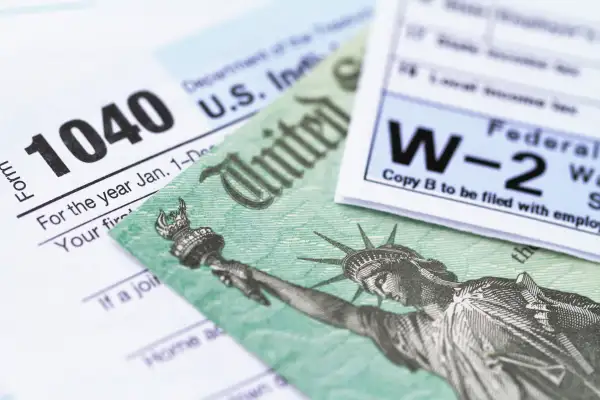Is the Coronavirus Delaying Your Tax Refund?

Amid the pandemic, the unemployment boom and the confusion over stimulus checks, you may have forgotten about your 2019 taxes.
Yes, tax season is still happening. And even though the IRS pushed back Tax Day to July 15, it's a good idea to file your income taxes sooner rather than later — especially if you're expecting a refund.
Extra cash sounds nice right now given the ongoing economic crisis. But the IRS is busy issuing coronavirus stimulus payments to some 150 million Americans, raising questions about its ability to also send out tax refunds on time.
Here's what we know.
The IRS Is Operating at a Reduced Capacity
The IRS has limited its services due to the coronavirus. Taxpayer Assistance Centers are closed, and live phone help is suspended. But the IRS website says it is still carrying out mission-critical functions. Specifically, it continues to "process tax returns, issue refunds and help taxpayers with available staff."
As Politico points out, the major refund-related problem has to do with paper returns. The closures mean the IRS can't process individual mailed-in returns, which are used by about 10% of people. If the IRS can't process a return, it can't issue a refund, so paper filers are looking at significant delays in getting their money back from the government.
For everyone else, the IRS says the fastest way to get your 2019 tax refund is to file electronically. Make sure you include your direct deposit information.
Millions of People Have Gotten Their Tax Refunds
Don't let complaints on social media fool you. As of May 1, the IRS had received some 125 million tax returns and processed roughly 113 million of them. It had issued just over 93 million refunds totaling more than $252 billion. The average tax refund was $2,707.
However, these numbers are lower than they were this time last year. The IRS has seen an 11% drop in the number of tax returns received so far. Roughly 7 million fewer refunds have been issued — a 7.2% drop from this point in 2019
How to Check Your Tax Refund Status
Most refunds are issued in less than 21 days. You can track your tax refund on the IRS website starting 24 hours after e-filing your return. You'll need to put in your Social Security number, your filing status and the exact refund amount from your tax return. The information updates every night.
The "Where's My Refund" tool is also available in Spanish.
Other Reasons for Tax Refund Delays
There are several possible non-coronavirus reasons your refund might not have been sent yet.
For example, your tax return may have included an error. You might have messed up your Social Security number, misspelled a name, made a math mistake, typed in an incorrect bank account number, claimed the wrong filing status or forgotten to sign. The IRS classifies these all as "common errors" that could lengthen the time it takes a return to process — and therefore a refund to be issued.
You may also be missing your tax refund because it was taken by the IRS to pay off debt. This is called a "refund offset" and can apply to outstanding child support, unpaid state taxes or unemployment repayments, according to the Taxpayer Advocate Service.
More from Money:
Tax Day Is Not April 15 This Year. Here's Why You Should File Your Return ASAP Anyway
Your Stimulus Check Is Not Just an Advance on Next Year's Tax Refund
True or False: You Won't Get a Stimulus Check if You Owe Money to the IRS
